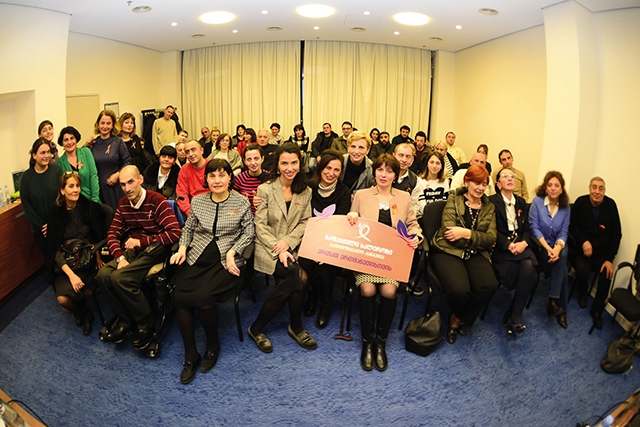We Must Unite! Patients with Multiple Sclerosis Waiting for Funding
We are patients with this terrible illness, and this is not our fault, - say Georgian patients with multiple sclerosis, accusing the Ministry of Health of neglect.
Patients for several years have been asking the State to make the treatment more available and to regulate and help provide financial solutions to problems related to it.
They have also been talking about the need for timely diagnosis and adequate treatment for a long time.
As a patient with multiple sclerosis, Maiko Mgeladze explains that patients in Tbilisi and the rest of Georgia are expecting funding in 2020. Their main demand is that the Georgian government, including the Ministry of Health and Tbilisi City Hall, make disease-modifying therapy available to everyone.
"Patients in Tbilisi and the rest of Georgia are looking forward to funding in 2020 and urge the Georgian government to make disease-modifying therapy available to us as well."
In 2019, the Ministry of Health of Ajara paid 25 thousand GEL for expensive medicines for patients with multiple sclerosis. The program has 10 beneficiaries at this stage. By 2020, however, the Ministry plans to increase the number.
“Some time ago, a government official asked us with surprised eyes - do you know how much money you are talking about and asking for ?! He forgot that we are talking about patients between the ages of 20 and 40 and about the country’s budget, which they and their family members contribute to. We are patients who bear no responsibility for having this terrible disease. The causes of the disease are unknown to the world, and no one knows which family will suffer from this devastating disease. So please, let’s unite for each other.We, the patients, definitely need state funding / co-financing of rehabilitation and therapy,” Maiko said.
MSSF, the Georgian Foundation for Multiple Sclerosis, demands provision of access to treatment for patients with multiple sclerosis and created a special petition for this purpose.
"Patients like me have been running a disease awareness campaign for several months with the support of doctors, and we have almost broken the stereotype called 'sclerosis' in society, that is, we have informed the public that multiple sclerosis is not a mental disorder or memory disorder,” Maiko says. “This is a disease felt by the younger generation, mainly female patients, and the initial symptoms appear at the age of 20 - 40, ie at a time when human labor or productivity is otherwise highest. Multiple sclerosis is a major cause of non-traumatic disability for patients. However, in the world there are a number of modifying drugs that significantly hinder disease activity and help maintain a patient's quality of life.”
The Georgian State protocol for clinical management of multiple sclerosis says that according to unofficial statistics in Georgia, there are 1,100-1,200 patients with multiple sclerosis. There is no information on the frequency of the disease in different regions.
We contacted the Health and Social Services Department of the Tbilisi City Hall, who confirmed that the agency does not currently have a program to finance the treatment of patients with multiple sclerosis. They added that they were “unable to discuss funding for such treatment at this time.”
To support people with multiple sclerosis, there has been a worldwide campaign ongoing since spring, titled "Bringing us Closer". The goal of the campaign is to raise public awareness about the disease, timely diagnose it and provide access to adequate treatment.
Information on Multiple Sclerosis:
Multiple sclerosis is a chronic, progressive neurological disease and approximately 2.3 million people worldwide have this pathology. The first symptoms mostly appear in the age group of 20 to 40 years and therefore multiple sclerosis is a major cause of non-traumatic disability in young people. The disease activity is very important in all forms of the disease - inflammatory processes in the nervous system is followed by the death of neurons in the brain. It is noteworthy that this process can continue even if the patient has no clinical symptoms. The primary purpose of treatment for multiple sclerosis is to reduce disease activity at an early stage so that disability is not progressed. Nowadays, modifying therapy for the treatment of multiple sclerosis is provided, which significantly reduces disease activity and progression of disability.
By Mariam Diasamidze












